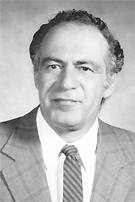About Dr. Silverman
Albert Jack Silverman, M.D., C.M., was a noted psychiatrist, neuroscience researcher and former chair of two university psychiatry departments. In 1970, he became chair of psychiatry at the University of Michigan Medical School. He is credited with redirecting the department's research, education and treatment programs, and leading during a time of great change. During his career, Dr. Silverman sought to bridge the divide between the rising field of neuroscience-based psychiatry and traditional psychoanalysis. After he stepped down from the chair in 1981, he remained on faculty and continued his research and the teaching of psychiatry residents. He retired as professor emeritus in 1990 and continued teaching and conducting rounds until 1997.
Born in Montreal on January 27, 1925, Dr. Silverman earned his bachelor's of science and medical degrees at McGill University. It was at McGill that he discovered his interest in the physical underpinnings of psychological phenomena - a field called psycho-physiology. After a residency in psychiatry at the University of Colorado Medical Center, he followed his mentor Ewald W. Busse to Duke University, where he became a member of the faculty.
He was naturalized as an American citizen in June 1955, took a leave from Duke, and entered the Air Force that year. During his two and one-half years of service at Wright-Patterson Air Force Base, he completed his board examinations in both neurology and psychiatry. Dr. Silverman led research for the U.S. Air Force on space neuroscience and psychology, which rose from obscurity to prominence literally overnight in 1957 with the launch of Sputnik and the dawn of the space race. In addition to performing key research on physical and psychological responses to G-force acceleration and space travel as chief of the stress and fatigue section of the Aero Medical Laboratory at Wright-Patterson Air Force Base, he helped invent a device that used pilots' brain waves as an oxygen-deprivation warning system.
In a 1991 oral history interview, Silverman recalled his Air Force experience: "This was right at the beginning of space exploration. Just prior to the Russians' putting up Sputnik, we were doing G-tolerance studies with the human centrifuge. We weren't allowed to call them moon trajectories or anything like that, because the senators were very negative about 'all of this space nonsense.' But in under 24 hours of Sputnik's going up, we got these hurry-up telegrams from headquarters saying, 'What are we doing in space [research]?' So we dusted off all the old technical reports we had been doing anyway, but under non-space names such as 'acceleration in unusual environments.' That kind of vague name now became, 'G-forces necessary for a moon trip,' which now became very kosher." Silverman left the service as a captain in 1957. He returned to Duke, heading the psycho-physiology lab and then the behavior studies lab. In all, his research during this period of his career led to more than 100 publications and presentations.
In 1963, Dr. Silverman went to Rutgers University where he and three other faculty members worked to establish a new medical school. This entailed architectural planning and supervision, and hiring the chairs of all departments of the medical school. He became chair of the first psychiatry department at Rutgers where he hired the faculty and worked for seven years. The school later became part of the New Jersey Medical School at the University of Medicine and Dentistry of New Jersey. He also studied psychoanalysis at the Washington Psychoanalytic Institute, graduating in May 1964.




